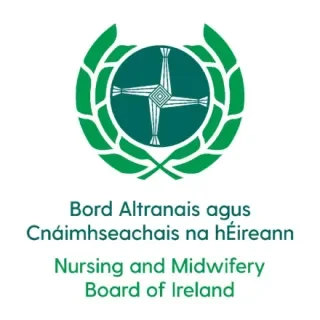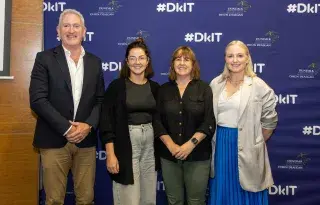BSc (Hons) in Midwifery

Search to find a different course
Course Overview
Over the duration of the course, learners will develop the knowledge, skills, and professional behaviours, that are necessary to become compassionate, competent, and committed healthcare professionals. Academic and clinical knowledge and skills will be developed throughout this rewarding course, using inclusive, authentic, learning approaches and simulated learning environments.
Students will gain their clinical experience in our partner clinical sites; Our Lady of Lourdes Maternity Unit, Drogheda, Cavan Hospital Maternity Unit and Letterkenny University Hospital Maternity Unit. Students will engage with both theoretical and practical learning opportunities, in preparation for their clinical placements. Many of these will take place within our state-of the- art clinical skills laboratories. Midwifery clinical placements account for fifty percent of this course and enable students to develop the professional knowledge, skills and behaviours needed to fulfil the role of a midwife.
What makes this course different
Placements Each Year
Clinical practice placements in each year and a 36-week internship placement in Year 4.
Professional Accreditation
Graduates will be eligible for professional registration with the Nursing and Midwifery Board of Ireland (NMBI).
Worldwide Recognition
This qualification is recognised world-wide and, once registered in your destination country, will allow you to travel abroad to work as a midwife.
Understanding the Industry
The term ‘midwife’ means ‘with woman’. Midwives recognise pregnancy, labour, birth and the post-natal period as healthy and profound experiences in women’s and people’s lives. The ethos of midwifery care is to work in partnership with women and their families, using professional knowledge, skills and attitudes to competently support individuals, infants and the wider community.
Midwifery care combines art and science. It is holistic and grounded in an understanding of the social, emotional, cultural, spiritual, psychological, and physical experiences of individuals. Midwifery care is consistently supported by the best available evidence. As a profession, midwifery protects and enhances the health of people, which in turn protects and enhances the health and well-being of society.
Career Opportunities
Future Careers:
- Registered Midwife
- Clinical Midwife Specialist
- Advanced Midwife Practitioner
- Neonatal Specialist
- Lactation Specialist
- Ultrasound Specialist
- Midwifery Management
- Midwifery Research
- Midwifery education
In these areas:
- Public Maternity Units: Antenatal wards, labour wards, postnatal wards, and neonatal units
- Midwifery-led units
- Community Practice
- Higher education institutions
Course Delivery and Modules
- Safe Healthcare Practice 1
- Clinical 1.1
- Midwifery 1.1
- Natural Science for Midwifery (a)
- Transition Support and Skills for Success
- Clinical 1.2
- Learning to Learn Skills for Success
- Midwifery 1.2
- Natural Sciences for Midwifery (b)
- Psychosocial Perspectives 1
- Clinical 2.1
- Midwifery 2.1
- Professional Practice
- Psychosocial Perspectives 2.1
- Clinical 2.2
- Exploring the Evidence
- Midwifery 2.2
- Psychosocial Perspectives 2.2
- Clinical 3.1
- Midwifery 3.1
- Psychosocial Perspectives 3
- Quality, Risk and Safety in Healthcare
- Advancing Professional Practice
- Clinical 3.2
- Critiquing the Evidence
- Ethical and Legal Practice for Midwifery
- Midwifery 3.2
- Applying the Evidence
- Clinical 4
- Integrated Professional Practice
- Midwifery 4
- Internship
Work placement
Clinical placements occur in each semester in each year of the programme. Each placement will help build clinical knowledge, skills, and professional behaviours in the journey towards becoming a registered Midwife.
In Year 4 (from January to September), students are rostered on a 9-month internship placement where they are employed and paid by the HSE and continue their learning as a service provider.
Professional Accreditations
Graduates will be eligible for professional registration with the Nursing and Midwifery Board of Ireland (NMBI).

Education Progression
Graduates are qualified to apply for a range of postgraduate programmes in midwifery such as the MSc. in Midwifery or Advanced Midwifery Practice (MSc.)
Certificate in Perinatal Mental Health
Certificate in Newborn Clinical Examination
Certificate in Comprehensive Advanced Health Assessment for Midwives
Fees and Funding
Please find information on fees and funding here: www.dkit.ie/fees
Entry requirements
In addition to the standard entry requirements below, a Laboratory Science subject at Grade O6 or H7 is also required. Applicants from NI/UK require a GCSE pass in a Laboratory Science subject (Biology, Chemistry or Physics) or GCSE Grade CC in Double Award Science. Single award GCSE Science is not applicable.
- Standard Requirements for Leaving Certificate Applicants
- Standard Requirements for UK/NI Applicants
- Standard Requirements for QQI-Further Education Applicants
- Mature Applicants: Minimum of 23 years of age on January 1st of year of application. The PAS carries out an assessment test on behalf of NMBI. Visit NursingCareers.ie for more information.
Please Note: Offers subject to successful Garda Clearance and Health Status Clearance from the Health Service Executive (North East) Occupational Health Unit. Students on the course are also subject to fitness-to-practice regulations.
Recent CAO points
How to apply
Apply on CAO
All standard entry first-year applicants must apply for entry through the CAO. See Important application dates for CAO and information for specific applicant types below:
Advanced Entry & Transfer Applications
Advanced Entry is for applicants who have previous educational achievements and/or work experience and want to be considered for direct entry into year 2, 3, or 4 of a course. This includes students looking to transfer to DkIT from another Higher Education provider.
Ask us a Question
If you have a question about the BSc (Hons) in Midwifery please ask it below and we will get back to you.
Course News
View all NewsDisclaimer: All module titles are subject to change and for indicative purposes only. All courses are delivered subject to demand and timetables are subject to change. Elective Module options will only run subject to student numbers. The relevant Department will determine the viability of each elective module option proceeding depending on the number of students who choose that option. Students will be offered alternative elective modules on their programme should their preferred elective option not be proceeding. Award Options for Common Entry Programmes: The relevant Department will determine the viability of each award option proceeding depending on the number of students who choose either option. If the numbers for one of the Award options exceed available places, students for this option will be selected based on Academic Merit (highest grades).







